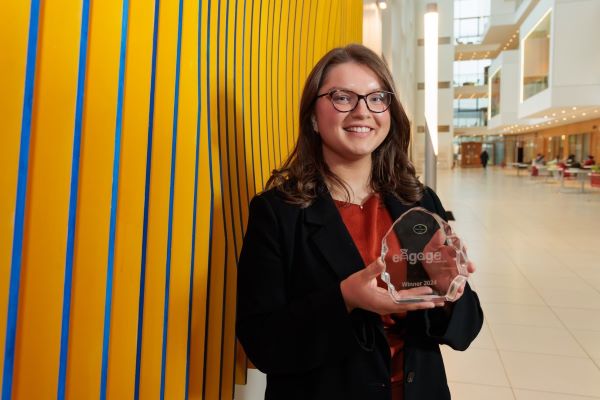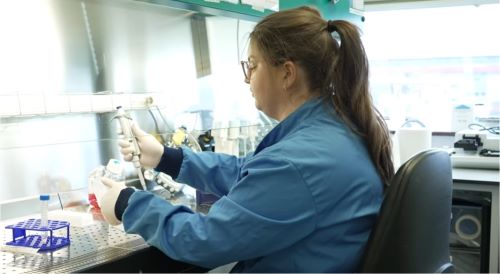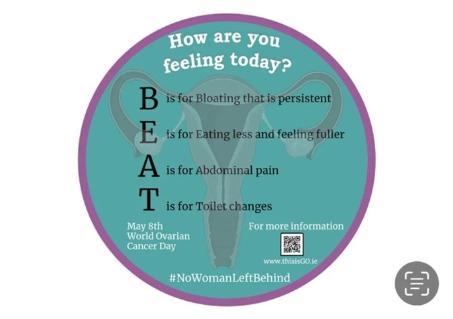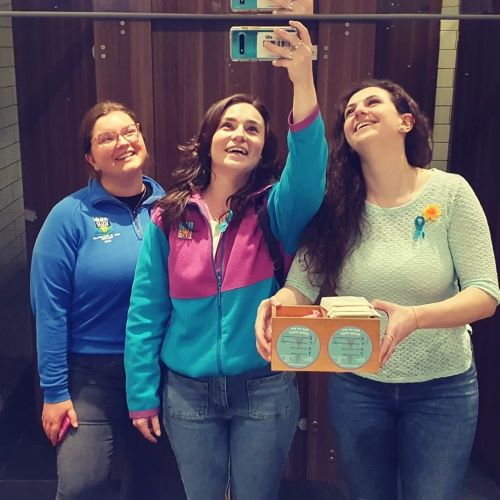Claire Hughes: Winner of ENGAGE 2024 who is seeking to enhance ovarian cancer treatments
News and Events
- 2025
- 2024
- MSc Alumni Panel Event
- Silver Athena Swan Award
- MSc Class of 2024 Graduation
- Nature Publication - Lisa Lombardi
- Class of 2024 Graduation & Medal Award Ceremony
- Claire Hughes: Winner of ENGAGE 2024 who is seeking to enhance ovarian cancer treatments
- ENGAGE Grand Final 2024
- SBBS Research Day 2024
- Professor Therese Kinsella - NovaUCD Innovation Award
- Athena Swan - Making SBBS a better place to work and study
- Conferring of Higher Degrees, Dec23
- 2023
- 2022
- 2021
- 2020
- 2019
- 2018
- 2017
- 2016
- Vacancies
- SBBS Ad Astra Fellows
Claire Hughes: Winner of ENGAGE 2024 who is seeking to enhance ovarian cancer treatments

Photo credit: Mark Harrison
The PhD researcher won the science communication competition ENGAGE 2024, an annual competition by UCD’s School of Biomolecular and Biomedical Science, where late-stage PhDs present their work to a public audience.
____________________________________________________________________________________________________________________________________________________
In the past, PhD researcher Claire Hughes, who is based at the School of Biology and Environmental Science (SBES), has delivered science outreach talks, such as during the first year of her PhD.
“I really enjoyed that first taste of outreach at the Irish Association for Cancer Research (IACR) Annual Conference. “At that stage of my research I spoke about what I wanted to do, but at this stage of my research, I wanted to share some of my results in a transparent way. ENGAGE provided me with that platform.”
Since the start of her PhD, Hughes had her eye on being part of the ENGAGE experience, and she enjoyed every minute of it. “I’ve learned loads about presenting, and different ways to share my research with audiences outside of my field. It’s been a lot of fun.”
‘Fun’ may not have been the word that Hughes associated with scientists when she was younger though. “In school, I thought that scientists live in isolation, locked up in the lab away from the world. But when I became a scientist and started working with other scientists, I realised that all scientists are normal people, and the lab is not a prison. It’s not a scary place!”
The important work
Back to the serious stuff. For her research, Hughes is looking at new ways to treat ovarian cancer, a form of cancer that impacts the lives of many families.
Ovarian cancer is the most lethal gynaecological cancer, with more than 400 cases per year in Ireland. Added to that, the 5-year survival for patients is just 35%, while early detection can be difficult to say the least. As a result, new treatments are needed to treat ovarian cancer quickly and effectively, and Hughes is playing her part by carrying out focused research on new treatments, whilst also incorporating the patient voice.
Before delving into the science of Hughes’ research, how did the young researcher who hails from Malahide, Co. Dublin end up as an ovarian cancer researcher?
A journey to a career in ovarian cancer research
“When I was 16 years old, my mom passed away from ovarian cancer. Of course, this played a big role in motivating me to work on ways to treat ovarian cancer,” says Hughes.
But Hughes didn’t start out in the world of science after she left secondary school. “I went right into a business degree, and I really didn’t connect with it. I didn’t feel like I was able to have a positive impact on the world around me. This just isn’t me. I always loved science, but I didn’t know what sort of career I would like to explore in science.”
After leaving the business degree, Hughes changed to a science degree, and she never looked back. “I especially loved learning about cancer biology. Not only was it interesting, but it offered the opportunity to do good and help people affected by cancers, such as ovarian cancer. I can’t change what happened to our family, but if I could do a little bit to help other families affected by the disease then I would have played a part in making things better for others.”
After her degree, Hughes was awarded a summer studentship from the Irish Cancer Society to undertake an ovarian cancer research project in Trinity College Dublin under the supervision of Dr Sharon O’Toole and Dr Mark Bates. She then started reaching out to ovarian cancer research groups as she wanted to do a PhD on the topic. And eventually she found her current position where she works in the group of Associate Professor (opens in a new window)Antoinette Perry.
Scientific evidence
Let’s get into some of the details of Hughes’ research where she’s turning to compounds found in cannabis to potentially enhance chemotherapy’s efficacy in eliminating ovarian cancer cells. And right away Hughes is keen to emphasise a critical point about her research.
“When some people hear about my project, they instantly think that I’m mad into cannabis,” says the young researcher with a chuckle. “Nothing could be further from the truth – I’m a real law-abiding person. I love a good rule!”
Nowadays, there are plenty of health food shops selling cannabidiol or CBD oils. CBD is an active ingredient in cannabis, but it’s not the one that causes a high. In other words, it’s not psychoactive. There are plenty of reports of anecdotal evidence that CBD oils can help people with cancer and provide symptom relief, something that Hughes is aware of.
“There’s quite a lot of misinformation online in relation to the effectiveness of CBD oils in the fight against cancer. I want to provide scientific evidence as to whether it can have an impact on ovarian cancer cells,” says Hughes. “The most important thing is to provide scientifically verified information about the effect CBD may have on ovarian cancer.

Claire Hughes at work in the lab. Photo credit: Claire Hughes
Finding cells
So, Hughes is combining CBD with various chemotherapy medications used to treat ovarian cancer, such as paclitaxel and carboplatin. Her initial results show that CBD helps paclitaxel to attack ovarian cancer cells, but unfortunately carboplatin can’t coordinate with CBD to give the same positive outcome.
But one key question in Hughes’ approach may spring to mind. Where does she get the ovarian cancer cells for her experiments?
Hughes: “In the past, people who have been diagnosed with ovarian cancer have had a sample of cells taken from their tumour, with their permission, and then these cells can be cultured and grown in the lab. This creates what is known as a ‘model of ovarian cancer’. These ovarian cancer models are known as ovarian cancer cell lines and are commercially available to research institutes or other companies who might be looking to test new treatments, for instance.”
Once Hughes and her colleagues pick the cell lines of interest, they order the cells from the company. “They arrive in a frozen tube. We then defrost them, grow them in a dish to create more cells, and after that use the cells for experiments.”
Being close to the patient
Using cells that originated from an anonymous patient who had a disease or condition in the past is the first step towards developing new drugs or treatments. Hughes, however, is striving to make her research more personal, which is where public and patient involvement (PPI) comes into focus.
“I would like to have PPI incorporated in all forms of cancer research. I think it’s important as it ensures the research is relevant and meaningful says Hughes. “This gives a reason as to why you would do something in the first place.”
In Hughes’ research, the Patient Voice has played a key role as she has spoken to those dealing with ovarian cancer in relation to treatment side effects, living with the condition, and misinformation surrounding CBD.
“Incorporating the opinions and lived experiences of people dealing with ovarian cancer has been invaluable to my research. It’s been amazing, and it gives you a better appreciation for why you are doing what you’re doing,” Hughes says.
Near the end of Hughes’ winning ENGAGE pitch she paid tribute to one patient who passed away a week before ENGAGE, whom Hughes had spoken to as part of her research.
World Ovarian Cancer Day

The sticker designed by Claire Hughes, Adele Connor, Romina Silva, Asia Jordan, Lea Schäfer, and Antoinette Perry to help inform the public about the symptoms to watch out for in relation to ovarian cancer as part of their efforts for World Ovarian Cancer Day.
One day that stands out for Hughes and ovarian cancer researchers and patients alike is World Ovarian Cancer Day which takes place on May 8th every year. The day was established in 2013 to raise awareness about the fight against ovarian cancer.
Early detection of ovarian cancer is quite difficult because the symptoms are quite vague and can be mistaken for other less sinister conditions.
So, to help raise awareness of the symptoms of ovarian cancer, Hughes along with Adele Connor, Romina Silva, Asia Jordan, Lea Schäfer, and her PhD supervisor Antoinette Perry designed a sticker with four symptoms that together indicate ovarian cancer. “We use the BEAT acronym to account for the symptoms of ovarian cancer. Two years ago, we gave out hundreds of the stickers in UCD and last year, we gave the stickers out for free to people on Grafton Street. We hope the BEAT stickers will improve the knowledge of ovarian cancer symptoms.”

Next steps
After the adventures of ENGAGE next up for Hughes is an internship over the summer at (opens in a new window)APC, a spin-out company from UCD School of Chemical and Bioprocess Engineering. In September, Hughes then returns to conclude the final year or so of her PhD research.
And what about after that? What does the future hold for the award-winning science communicator?
“I’d like to stay in cancer research, staying in ovarian cancer research would be a bonus,” says Hughes. “I’d like to get the chance to continue doing research on ovarian cancer. I feel that I’m in the first stages of my work in the area, and I’d like to be part of the story moving forwards, particularly when it comes to doing research with the patient voice always considered.”
Further information
Claire Hughes is based at the School of Biology and Environmental Science (SBES). Her supervisors are Associate Professor Antoinette Perry and Dr Susanne Schilling. Her lab group is the Perry lab, but she’s also a part of the Cancer Biology and Therapeutics (CBT) lab.
Find out more about the ENGAGE 2024 competition and pitches presented by the finalists in the competition HERE
About the writer
Barry W. Fitzgerald is a science communicator, physicist by training, author, presenter, and YouTuber. Originally from Limerick, he now lives in the Netherlands. He is an Adjunct Associate Professor at SBBS. Barry is based in the Netherlands where he works as a science communicator at Eindhoven University of Technology. He’s also involved in several science communication and outreach initiatives through his company BW Science. When he’s not delving into the magical world of science, you’ll find Barry out running or watching popular culture content.